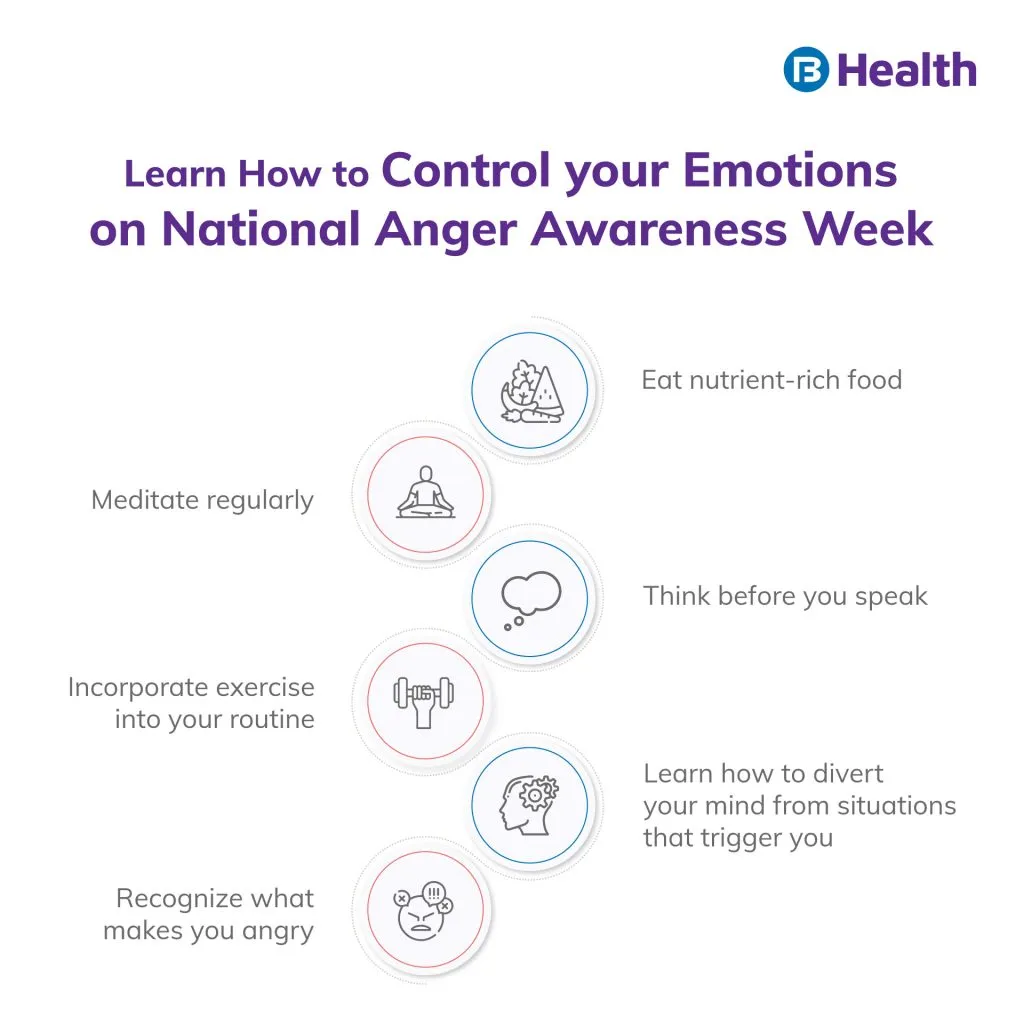General Health | 5 min read
National Anger Awareness Week: Learn How to Control Anger
Medically reviewed by
Table of Content
Synopsis
National Anger Awareness Week encourages people to participate in managing their potent emotions. The purpose of Anger Awareness Week is to draw attention to anger as a troubling social issue that needs to be discussed openly and appropriately.
Key Takeaways
- National Anger Awareness Week aids individuals in becoming aware of the indicators that can help them control anger
- When anger isn't expressed and acknowledged, it escalates into a major issue
- The guidelines on managing your rage during "difficult" conversations may help you voice your opinions
The goal of National Anger Awareness Week, which runs from December 1–7, is to understand what triggers anger and how you may advocate for yourself without losing your cool or worrying about whether you'll succeed.
To effectively cope with anger, whether it is their own or that of others, individuals need to learn how to befriend it. National Anger Awareness Week tries to help individuals by providing them with the tools and advice they need to control their emotions. Did you know December is also considered the constipation awareness month? [1]
Anger management can help you maintain control, say what needs to be said, and listen to others so conflicts can be resolved sympathetically and professionally. However, various emotions and behaviours, not only anger, can lead to conflict in your personal and professional life. Understanding and expressing emotions is more important than you might realize.
Emotions significantly affect how you react to a specific scenario. When you are in tune with your emotions, you have access to critical knowledge that aids you in the following:
- Decision-making
- Enduring relationships
- Everyday interactions
- Self-care

What Makes People Angry?
Although emotions can be useful in day-to-day life, when they are out of control, they can harm your emotional well-being and interpersonal connections.
Emotions are either good or bad feelings connected to various things, including thoughts, actions, pleasure, and discontentment. On the other hand, anger is a strong emotional state that involves a resolute reaction to a perceived injury, provocation, or threat.
It is acceptable to be furious since anger is a normal, healthy feeling everyone experiences. When we get upset, our bodies respond by creating adrenalin. This can sometimes be energizing and give us more energy, but it can also make us feel tight and uneasy and put us into a "fight or flight" mindset.
As individuals are expected to treat one another with respect and uphold corporate values, anger management is important in the workplace. However, angry people frequently have harsh opinions of themselves and transfer these opinions onto other people. Conflict results from this, tension rises, and resentment grows.
The National Anger Awareness Week 2022 theme will help people understand the warning signs to control their anger.
- Quicker breathing and a faster heartbeat
- Sensing stress in your shoulders or other body parts
- Making clenched fists
You must be in control and have proper self-esteem to prevent your anger from controlling you. Be honest about how you feel and know the cause of your anger and how to deal with it if you are furious. Being defensive makes it more challenging to have discussions and comprehend what needs to be done for each party to feel heard, appreciated, and safe.
How to Control Emotions?
These guidelines on controlling your anger during "challenging" conversations might assist you in expressing your views while maintaining your composure and coming to a resolution:
- Take a moment to pause, reflect, and consider the broader picture, including your goals and proposed strategies
- To feel prepared, practice what you are going to say
- Remind yourself to "keep it together" and make an effort not to take the situation personally
- Have complete confidence in the conflict-related guidelines
- Recognize that people's differences of opinion are acceptable
- Pay close attention to what others are saying and show empathy
- Maintain composure and thank people for listening to you at all times
- Expressing your feelings may enable you to view the problem from a different perspective. It may also enable you to quit repressing your rage
- Pay attention to your diet. Moods can be impacted by food. A healthy diet is likely to make you feel more in control of your emotions because deficiencies in some nutrients can make you feel irritated and weak
- Running, walking, cycling, swimming, yoga, and meditating are just some of the activities that can assist you in relaxing and lowering your overall stress levels
- Getting enough sleep is particularly essential since fatigue can make us irritable even in the absence of other factors that might cause us to get angry
- Drug addiction and alcoholism can aggravate anger issues. It is said that drugs reduce inhibitions, and we need inhibitions to stop us from misbehaving when we're furious
- Identifying your triggers can often be extremely beneficial, so do so. If you have trouble identifying your triggers, talking to a therapist about your feelings and the reasons for these patterns may also be useful
- There are various artistic and constructive ways to explore and let go of some of the feelings associated with expressing anger, including writing, singing, dancing, and role-playing

Everybody can occasionally find it difficult to learn to regulate their feelings and anger. Even the calmest and most controlled person would go through phases of anger. It is a feeling that appears during times of utmost need and occasionally causes you to act in unthinkable ways. It may be necessary for you to confront your anger and turn to strategies for controlling and managing it, though, if it frequently turns violent and outbursts.
If anger is not dealt with immediately or over time, it could create unsafe circumstances or become a destructive force in marriage and relationships. Anger becomes a serious problem when it isn't voiced and recognized, and issues that need to be resolved won't receive the attention they require.
Knowing how to control anger is vital for an individual's overall development, which is also the aim of UNICEF day (falling on 11th December). UNICEF Day aims to fight for the rights of children that will help their overall development from childhood to adulthood.[2]
To Change For The Better
Consider getting an online doctor consultation if none of these strategies proves effective. You can work through underlying issues that may contribute to anger and other emotional problems with the assistance of a top mental health professional or therapist by consulting online through Bajaj Finserv Heath. In addition, people participating in National Anger Awareness Week are encouraged to consider how anger affects their lives and develop original solutions for managing this potent emotion.
References
- https://carolinapelvichealth.com/holiday-treats-weighing-you-down-december-is-constipation-awareness-month/#:~:text=December%20is%20Constipation%20Awareness%20Month!
- https://www.news18.com/news/lifestyle/unicef-day-2021-theme-history-significance-and-inspiring-quotes-4542146.html#:~:text=UNICEF%20Day%20is%20observed%20on,December%2011%20in%20year%201946.
Disclaimer
Please note that this article is solely meant for informational purposes and Bajaj Finserv Health Limited (“BFHL”) does not shoulder any responsibility of the views/advice/information expressed/given by the writer/reviewer/originator. This article should not be considered as a substitute for any medical advice, diagnosis or treatment. Always consult with your trusted physician/qualified healthcare professional to evaluate your medical condition. The above article has been reviewed by a qualified doctor and BFHL is not responsible for any damages for any information or services provided by any third party.



